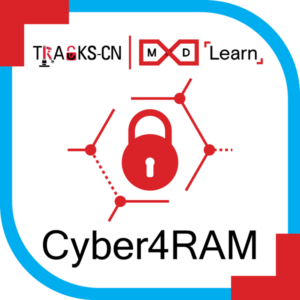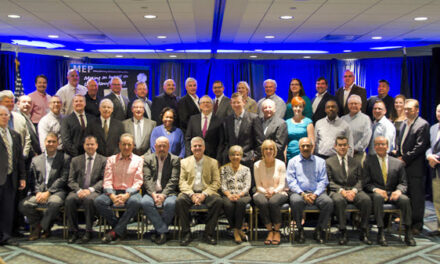Raleigh, North Carolina – January 2023 – The North Carolina Manufacturing Extension Partnership (NCMEP) initiative, The Robotics/Automation and Cybersecurity Knowledge Sharing Coordination Network (TRACKS-CN), has officially launched its Cyber for Robotics/Automation/Mechatronics (Cyber4RAM) digital badge.
 TRACKS-CN is a grant project funded by the National Science Foundation (NSF) and developed by a network of 22 partners, including community colleges, manufacturing extension partnerships (MEPs), Manufacturing USA Institutes and other institutions and initiatives across the US. The network promotes education and training at the convergence of robotics/automation/mechatronics (RAM) and cybersecurity. This core mission inspired the creation of the Cyber4RAM badge, available at no cost through the grant.
TRACKS-CN is a grant project funded by the National Science Foundation (NSF) and developed by a network of 22 partners, including community colleges, manufacturing extension partnerships (MEPs), Manufacturing USA Institutes and other institutions and initiatives across the US. The network promotes education and training at the convergence of robotics/automation/mechatronics (RAM) and cybersecurity. This core mission inspired the creation of the Cyber4RAM badge, available at no cost through the grant.
With cybersecurity threats advancing at an alarming rate, manufacturers must know what it takes to protect their organizations from cyberattacks. The TRACKS-CN team determined that a digital badge is an effective way to spread cybersecurity awareness to those involved in manufacturing within the Operational Technology (OT) realm of RAM.
The digital badge presents real-life scenarios that learners must work through using the knowledge they gain in the corresponding module. Dr. Evelyn Brown, the director of extension research and development for NC State Industry Expansion Solutions (IES) and the head facilitator of TRACKS-CN had this to say about the digital course: “The Cyber4RAM badge will allow manufacturing employers to provide their employees with no-cost, easy-to-understand cybersecurity awareness training that is specific to the manufacturing industry. For manufacturers, having employees who can recognize the signs of a cyberattack is vital in reducing a manufacturer’s risk of becoming a hacking statistic.”
The 11 competencies covered by the badge were selected from a list of 54 Workforce Framework for Cybersecurity competencies published by the National Initiative for Cybersecurity Education (NICE). The 11 competencies tied to advanced manufacturing.
NICE Competencies Included in CYBER4RAM Badge Course:
- Asset and Inventory Management
- Computer Languages
- Data Privacy
- Data Security
- Digital Forensics
- Identity Management
- Incident Management
- Infrastructure Design
- Physical Device Security
- Systems Integration
- Vulnerabilities Assessment
Once the course is completed, the learner will understand the 11 NICE competencies presented in the badge modules and will be able to confidently carry out their job responsibilities and be able to recognize signs of cyberattacks.
To access the digital course, please visit ncmep.org/tracks-cn/badge. For more information on how the North Carolina Manufacturing Extension partnership can help your manufacturer, visit ncmep.org
About the North Carolina Manufacturing Extension Partnership
The North Carolina Manufacturing Extension Partnership (NCMEP) is the state network in North Carolina for the national Manufacturing Extension Partnership (MEP) which is part of the Commerce Department’s National Institute of Standards and Technology (NIST). MEP is a unique public-private partnership that delivers comprehensive, proven solutions to manufacturers, fueling growth and advancing U.S. manufacturing. NCMEP is administered by NC State University Industry Expansion Solutions (IES) and is joined by partners from the North Carolina Community College System, NCWorks Customized Training; the Economic Development Partnership of NC; the Polymers Center of Excellence; the Manufacturing Solutions Center; NC A&T State University Center of Excellence in Product Design and Advanced Manufacturing; Hangar6; East Carolina University College of Business; the University of North Carolina at Charlotte Industrial Solutions Lab; and NC State University Wilson College of Textiles.
This material is based upon work supported by the National Science Foundation under Award No. 2000867. Any opinions, findings and conclusions or recommendations expressed in this material are those of the author(s) and do not necessarily reflect the views of the National Science Foundation.











